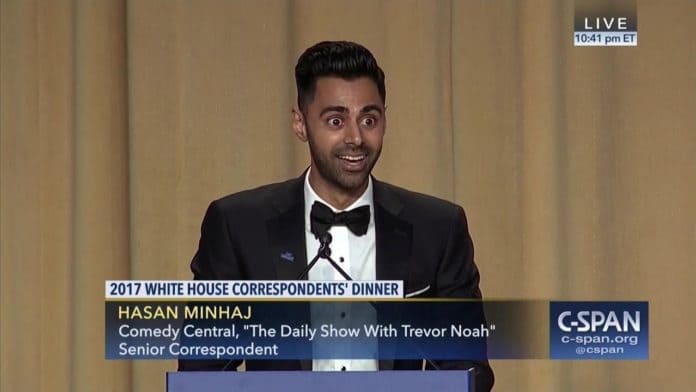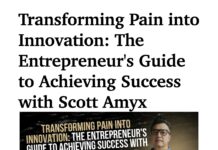Who knew a Muslim Indian-American would be performing at the 2017 White House Correspondent’s Dinner for Trump’s Administration (in Minhaj’s words “Orange man who banned the Muslims”), in the tradition of Frank Sinatra, Mark Russel, Jay Leno, Conan O Brain, Bill Maher, Stephan Colbert, Seth Mayers, and Jimmy Kimmel.
Being a minority means being different. It means that some random act of some individual from your group will be representing the whole group. Hasan Minhaj had to counter racism at every step from a very early age. From seclusion on the school bus, inability to make friends at school to being stood up on prom night because of his color. He was ridiculed by school peers for being “poop-colored.” In 3rd grade, his answer to what he wanted to be when grows up was to be white. He just wanted to fit in. He had to strive hard to achieve success.
In his words, “Sneaking out of my house to go to the prom was the most badass thing I had ever done. For the first time in my life, I grabbed the reigns of an opportunity and just went for it. No matter the consequences, that night was the epitome of my American Dream.” But then his date’s parents refused to let their daughter go to the prom because of Hasan’s skin color. After the disappointing no show, Minhaj’s father advised him, “Hasan, you gotta be brave, man. Your courage to do what’s right has to be greater than the fear of getting hurt.” That was a life turning lesson for him. He realized the importance of taking risks to achieve what he wanted even in the face of failures.
He studied Political Science at U.C. Davis and worked as an engineer before he transitioned to pursuing his dream of becoming a comedian. He took a major ‘bet-the-farm’ risk, abandoned his career, and channeled all his energy and focus to become a comedian. He started his journey in 2004. He persevered for years to be noticed. He aimed to reclaim the Muslim heritage from post-9/11 stereotypes and instead tried to offer a richer view of navigating his American and Muslim cultures. After doing stand-up comedy for over 10 years, he was hired to join the Emmy and Peabody Award-winning program “The Daily Show with Trevor Noah” on Comedy Central in 2014. Those 10 years were ripe with financial and personal hardships.
What he wanted more than being a comedian was to be accepted. His hard work finally paid off. The American society finally accepted him, his jokes, and the diversity that he represented after years of persevering under the radar at comedy clubs. Now he is a well-recognized comedian, actor, and writer who resides in New York.
Minhaj was selected by the Sundance Institute for a one man show “Homecoming King” on Netflix this year. He is also a featured storyteller on The Moth Radio Hour. He hosted the documentary special Stand Up Planet produced by The Bill and Melinda Gates Foundation. He runs a viral web series called The Truth with Hasan Minhaj which has been featured in countless publications. He appeared on many other television programs including Arrested Development on Netflix, HBO’s Getting On, and @Midnight on Comedy Central.
Minhaj has asked his supporters to donate to the American Civil Liberties Union and the Council on American-Islamic Relations to help those affected by the new administration’s policies. He advocated for the American Muslim community to fight for LGBT rights. Even in WHCD ’17, he stood up for free press and speech and democracy. He made a statement that even the President is not beyond the reach of the 1st Amendment. He took this opportunity to represent a minority class which doesn’t accept the administration’s narrative. It was based on this courage to uphold the freedom of speech that he was nominated to present at the White House Correspondents’ Association Dinner to a room full of top journalists from all major media. They, in turn, applauded his courage.
How are you doing the things most uncomfortable to achieve success?


















